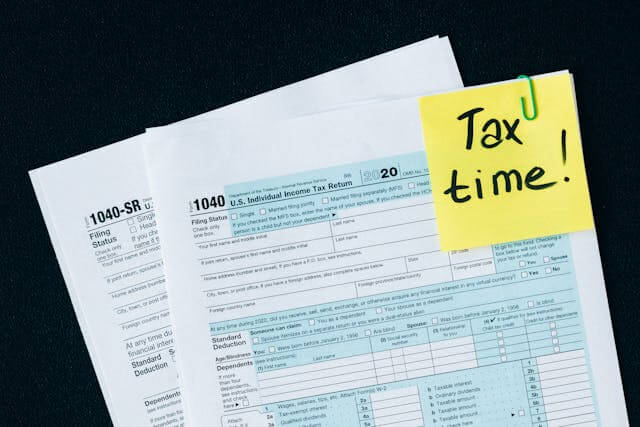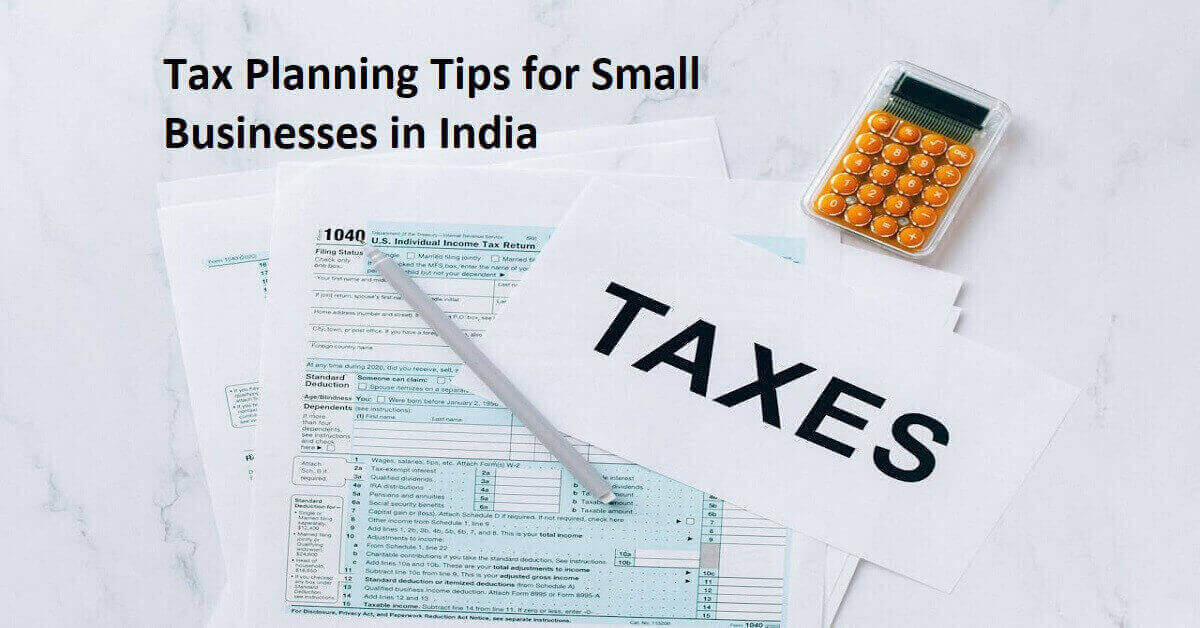Tax Planning Tips for Small Businesses in India: For small enterprises in India to lower tax obligations, boost savings, and guarantee adherence to laws, effective tax planning is crucial. Businesses may maximise revenues and reinvest savings for expansion by putting smart tax solutions into practice.

In order to assist small companies in India save more money and expand more quickly, this book provides important tax-saving strategies, deductions, exemptions, and best practices. These tax planning techniques can help you optimise your savings and enhance cash flow, regardless of your business’s status as a start up, freelancer, or MSME (Micro, Small, and Medium Enterprise).
1. Select the Appropriate Business Structure
Your choice of company entity has an impact on taxes. Choose a structure that reduces your tax obligations:
✔ Simple yet subject to personal income taxation at individual slab rates is the sole proprietorship.
✔ The tax rate for partnership firms is a flat 30% plus cess.
✔ Limited Liability Partnership (LLP): No dividend distribution tax (DDT) but a flat 30% tax.
✔ Private Limited Company (PLC): subject to 25% tax (turnover under ₹400 crore) or 22% tax (new regime).
📌 Hint: Private limited corporations and limited liability partnerships sometimes have more tax advantages than sole proprietorships. A tax professional should be consulted prior to deciding on your business structure.
2. Make use of small businesses’ presumptive taxation scheme
Under Section 44AD, companies having annual revenue up to ₹2 crore may choose to participate in the Presumptive Taxation Scheme (PTS).
There is no need for an audit or bookkeeping under this plan, and taxes are paid at a rate of 8% of turnover (6% for digital transactions) without keeping books of accounts. saves time and lowers the cost of compliance.
📌 Ideal for: Independent contractors, small business owners, and service providers.
3. Make a Deduction for Business Expenses
By claiming deductions on qualified business costs, small firms can lower their taxable income. Examples of these expenses include:

✔ Office Rent & Utilities: Subtract maintenance, power, and rent.
✔ Employee Benefits & Salaries: Subtract medical benefits, PF contributions, and employee pay.
✔ Asset Depreciation: Make a claim for depreciation on automobiles, machinery, and equipment.
✔ Marketing & Advertising: Promotional, digital, and branding costs are all deductible.
✔ Professional Fees: Amounts paid to tax advisors, attorneys, consultants, and certified public accountants.
✔ Business Travel & Transportation: Subtract travel, airfare, and lodging costs.
📌 Advice: When filing taxes, keep accurate documents and invoices to back your claims. For convenience, digital record-keeping is advised.
4. Apply for the Input Tax Credit (ITC) and register for GST
GST registration is required if your company’s sales surpasses ₹20 lakh (₹40 lakh for goods firms).
✅ To get a return of GST paid for business purchases, you can apply for an Input Tax Credit (ITC).
✅ Choose the GST Composition Scheme: If your turnover is less than ₹1.5 crore, you will pay a reduced fixed tax rate (1%–6%).
✅ Submit GST Returns on Time: To guarantee ITC advantages and prevent fines.
📌 Advice: Use accounting software that complies with GST and keep accurate GST invoices.
5. Benefit from Section 80C and Section 80D Tax Deductions
✔ Section 80C: You can deduct up to ₹1.5 lakh for investments in life insurance, PPF, EPF, and ELSS mutual funds.
✔ Section 80D: Deduct family, employee, and self-health insurance premiums.
✔ Get tax incentives for recruiting new employees under Section 80JJAA (applicable to enterprises employing 50+ personnel).
📌 Advice: ELSS mutual funds and PPF investments provide both tax savings and long-term wealth accumulation.
6. Keep accurate accounting and bookkeeping records
A clean financial record facilitates tax filing and helps firms avoid fines.

✅ Utilise accounting software such as Tally, QuickBooks, or Zoho Books.
✅ Keep track of payroll information, purchase records, invoices, and tax payment receipts.
✅ To guarantee compliance and optimise deductions, use a certified public accountant or tax advisor.
📌 Advice: Maintaining correct documentation helps avoid audits and last-minute tax filing anxiety.
Frequently Asked Questions (FAQ)
1. Which tax-saving strategy is ideal for Indian small businesses?
Because it lowers the criteria for tax compliance, the Presumptive Taxation Scheme (Section 44AD) is the ideal choice for companies with annual revenue under ₹2 crore.
2. In India, how can I lawfully lower my company tax?
By claiming business expenditure deductions, registering for GST to claim Input Tax Credit, investing under Section 80C, and choosing a tax-friendly business structure, you may reduce your taxes.
3. Does India offer any exemptions from start up taxes?
Yes, firms that are registered with Start up India are eligible for a reduced corporation tax rate, a three-year tax vacation, and an exemption from angel tax.
4. If I work from home, can I write off the rent I pay for my house?
Yes, you can deduct a portion of your rent as a business cost if you utilise a section of your house only for work-related activities.
5. What occurs if I fail to make an advance tax payment?
Sections 234B and 234C may impose interest if your yearly tax due exceeds ₹10,000 and you fail to pay advance tax.
6. Does every small firm have to pay GST?
No, GST is only necessary if your company’s revenue surpasses ₹20 lakh for services or ₹40 lakh for commodities.
7. How can I stay clear of tax penalties?
✔ Submit income tax and GST returns on time to avoid fines.
✔ Make installment payments for advance tax.
✔ Keep correct bills and records.
✔ For tax planning, speak with a CA.
8. Can I deduct expenses from company loans?
In accordance with Section 36(1)(iii), interest paid on business loans is deductible.
9. What are the tax savings advantages of digital payments?
Companies that want to do all of their business online can take advantage of the Presumptive Taxation Scheme’s reduced tax rates (6% as opposed to 8%).
10. Should I get tax planning help from a CA?
Small firms are capable of handling their own taxes, but employing a certified public accountant or tax adviser guarantees greater compliance, optimises tax advantages, and lowers audit risks.
Conclusion
Small companies may lower their tax obligations, increase their savings, and make growth investments with the aid of efficient tax planning. Businesses may maximise savings and preserve compliance by putting the proper tactics into place, such as utilising tax exemptions, keeping financial records, claiming deductions, and choosing digital transactions.
📌 Key Takeaways:
✔ To lower taxes, pick the appropriate business structure.
✔ To reduce the burden of compliance, use presumptive taxation.
✔ To lower taxable income, deduct company expenses.
✔ Apply for input tax credit and register for GST.
✔ Benefit from start up tax exemptions.
✔ To avoid penalties, pay taxes in advance and file returns on time.
✔ To ensure a seamless tax filing process, use accounting software.
💡 Make plans now to reduce taxes and accelerate business growth!
📢 Have enquiries about taxes? Post them in the comments section or forward this information to other entrepreneurs! 🏆
Tax Planning Objectives Explained: Secure Your Financial Future!
Types of Tax Planning in India: Smart ways to Save Tax!
What is Tax Planning? A Complete Guide
Best Tax-Saving Investments in India: A Complete Guide
